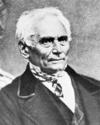- Purkinje, Jan Evangelista
-
born Dec. 17, 1787, Libochovice, Bohemiadied July 28, 1869, Prague, Czech.Czech experimental physiologist.He discovered the Purkinje effect (as light decreases, red objects appear to fade faster than blue ones), Purkinje cells (large branching neurons in the cerebellum), and Purkinje fibres (which conduct impulses from the natural pacemaker throughout the heart). At Breslau he created the world's first independent physiology department and first official physiology laboratory. He introduced the term protoplasm, devised new methods for preparing microscope samples, discovered the skin's sweat glands and the nucleus of the unripe ovum, recognized the uniqueness of fingerprints, and noted that pancreatic extracts digest protein.
 PurkinjeCTK-Czechoslovak News Agency
PurkinjeCTK-Czechoslovak News Agency* * *
▪ Czech physiologistborn Dec. 17, 1787, Libochovice, Bohemia [now in Czech Republic]died July 28, 1869, Praguepioneer Czech experimental physiologist whose investigations in the fields of histology, embryology, and pharmacology helped create a modern understanding of the eye and vision, brain and heart function, mammalian reproduction, and the composition of cells.Purkinje's research at the University of Prague (M.D., 1819), where he later served as professor of physiology (1850–69), led to his discovery of a phenomenon known as the Purkinje effect (as light intensity decreases, red objects are perceived to fade faster than blue objects of the same brightness). His studies of human vision attracted the attention of the German poet J.W. von Goethe, who befriended the Bohemian student and may have been instrumental in obtaining for him the chair of physiology and pathology (1823–50) at the University of Breslau, Prussia. There Purkinje created the world's first independent department of physiology (1839) and the first official physiological laboratory, known as the Physiological Institute (1842).A founder of laboratory training in connection with university teaching in Germany, Purkinje is best known for his discovery of large nerve cells with many branching extensions found in the cortex of the cerebellum of the brain (Purkinje cells; 1837) and of the fibrous tissue that conducts the pacemaker stimulus along the inside walls of the ventricles to all parts of the heart (Purkinje fibres; 1839). In describing young animal embryos, he introduced protoplasm as a scientific term.First to use the microtome (a mechanical device for slicing thin tissue sections), glacial acetic acid, potassium bichromate, and Canada balsam in the preparation of tissue samples for microscopic examination, Purkinje also described the experimental effects on humans of camphor, opium, belladonna, and turpentine (1829) and the visual images produced by poisoning with digitalis and belladonna. He discovered the sweat glands of the skin (1833) and the germinal vesicle, or nucleus of the unripe ovum, that now bears his name (1825), recognized fingerprints as a means of identification (1823), and noted the protein-digesting power of pancreatic extracts (1836).* * *
Universalium. 2010.
